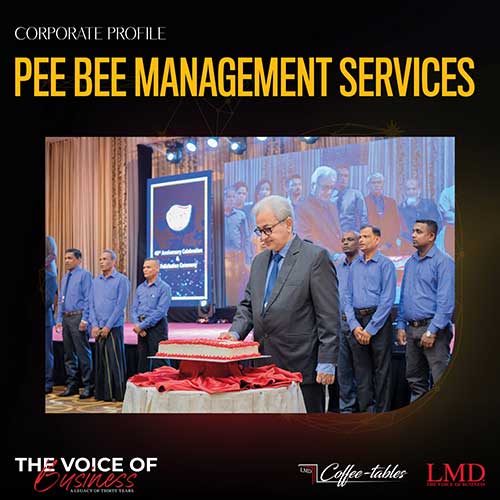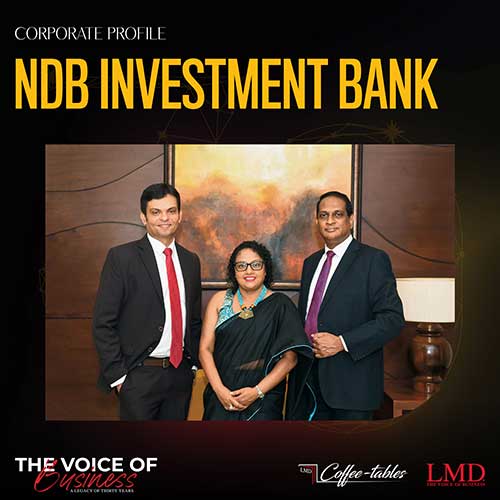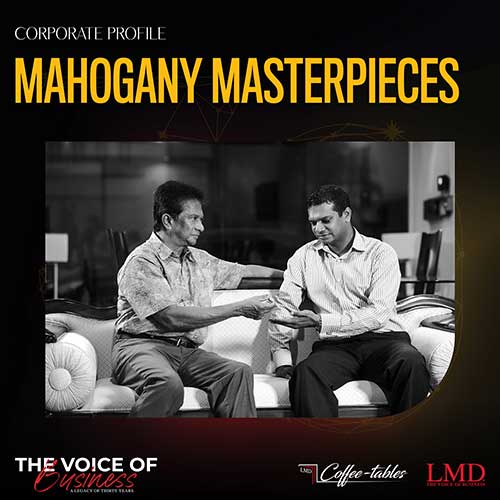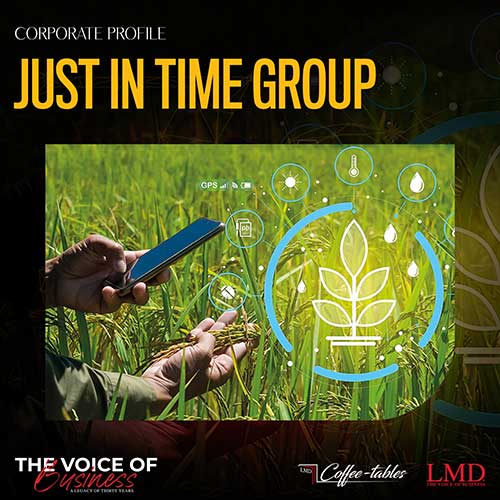REFLECTIONS
FROM THE THIRD DECADE
A selection from LMD’s Cover Stories
MAY 2016
MAKING SPACE FOR SRI LANKA
Sir Richard Branson talks to the Interview Hub’s Shaun Curram about Sri Lanka, his views on the global economy and hopes for sending people into space within 10 years

He is one of the most recognisable businessmen in the world. And he’s certainly one of the most successful. According to Forbes, his net worth last year amounted to a whopping US$ 5.1 billion. But is the Virgin Group owner about to invest his hard-earned money in Sri Lanka?
Is Sir Richard Charles Nicholas Branson – entrepreneur, philanthropist, celebrity, and one of the world’s leading and instantly recognisable businesspeople- ready to finally invest some of his considerable fortune in Sri Lanka?
This has been a question that’s been asked for several years now, with both the Government of Sri Lanka and the 65-year-old business magnate playing a polite yet strategic game of cat and mouse – the Sri Lankan authorities are desperate to catch some of Branson’s ingenious business nous, restlessly inventive mind, egocentric charisma and above all, wealth: to highlight the country’s economic and social credentials as it enters a period of renewed stability.
The man himself has always remained open to the possibility, even if he’s invariably difficult to pin down on the subject. But is all the evasiveness about to end?
After all, the British tycoon has proved – over a four decade long business career of phenomenally successful highs and (occasional) lows – that he is never afraid to put his money where his mouth is… and take risks with his own riches.
In his Twitter handle, Sir Richard describes himself to his 7.3 million followers as a “tie loathing adventurer, philanthropistand troublemaker, otherwise known as Dr. Yes at Virgin who believes in turning ideas into reality.”
Nobody could really have put it better than the man himself and with a portfolio of 200 plus business ventures – including aircraft, trains, gyms, hotels and cable television – he is as good as his word.
BUSINESS OPPORTUNITY And the sense is that he might yet be about to stump up the cash to invest in Sri Lanka.
Last summer, Sri Lankan Prime Minister Ranil Wickremesinghe telephoned the billionaire to personally invite him to visit the island – this time, with a view to exploring investment opportunities. The pair eventually met at the World Economic Forum in Davos in January, during which Branson is reported to have confirmed his interest in looking at Sri Lanka’s tourism industry, which is a particular area of his expertise.
Sri Lanka’s tourism industry reported a noteworthy increase in arrivals last year, with nearly 1.8 million visiting its shores – that’s a growth of 17.8 percent year-on-year. In the 12 months ended 31 December 2015, the island earned almost US$ 3 billion from tourism, compared to 2.4 billion dollars in the previous year.
The global business icon remains cagey on any potential details but admits the region’s increasing post-conflict stability is a factor in his consideration of Sri Lanka as a business opportunity.
“I wouldn’t say everything is perfect and there are still issues; but the end of the conflict has only been a good thing for Sri Lanka,” he says, adding: “Clearly, there is so much potential and that’s the one thing that any entrepreneur seeks out because it’s the perfect storm in business – commercial gain and the chance to transform lives. That’s really the perfect combination because everyone wins.”
BUSINESS MODEL As ever with Branson though, the final decision will rest predominantly on whether or not he and his vast team of advisers and aides feel that Virgin can produce a product that will positively impact the lives of those people.
“That is always the crux of it,” Branson explains, while revealing that it “is always what we are looking to do. It is always at the core of our business model. If you can make a product that will undoubtedly make people’s lives better, more enjoyable, more functional or easier in some way, then you’re on to a winner.”
He elaborates: “It is absolutely fundamental you do all the research; because if you’re giving people something they already have, then it won’t turn people on enough to buy it. If you’re offering something that they don’t have, that you think they will later grow to love and rely on, then you can make a successful product,” he affirms.
“If you take Sri Lanka as an example, you look at the conditions, what the market looks like and assess it. Where is the gap you can fill? Once you identify something, you can find the best possible people to work on it, to make it a reality – and then go for it,” he states.
INVESTMENT POTENTIAL Putting aside the business aspect of any potential investment, the matchup with Sri Lanka would make sense from a personal point of view.
Branson has spoken in the past about his growing interest in and respect for the country. He’s previously joked about his love of Ginger Beer, which he says he “discovered in Sri Lanka so I owe it that at least!” Like much of what Branson says in public, often with his tongue firmly in his cheek, the comment was a mixture of his true feelings and the inimitable sense of mischief that underlines much of what Branson does. Beneath that jovial comment lay Branson’s growing admiration for Sri Lanka.
He has been a frequent visitor to the country in the capacity of a tourist over the last few years. And Branson was so impressed with its development that he instructed Virgin Airlines to fly to the island from select destinations around the world.

CORPORATE PHILANTHROPY In 2009, Sir Richard also founded, alongside the late former South African President Nelson Mandela, the humanitarian organisation The Elders, which has aided war-torn areas – Sri Lanka included – to reach peaceful settlements through diplomatic discourse.
Branson’s philanthropic values remain at the centre of his work. Such is his far-reaching influence – rarely seen among the towering figures of a business community that is often treated with cynicism, his opinions are respected and sought after among the wider populace – that Branson is in a position to champion the causes that are dear to his heart, knowing that he retains a captive audience that is receptive to his thoughts.
CLIMATE CHANGE MILESTONE Increasingly, over the years, one of his preoccupations has been climate change. Branson was so concerned about its effects on the planet that he founded B Team – a group of business leaders (including Unilever’s Paul Polman and Indian industrialist Ratan Tata) who set out to lobby governments around the world to commit to a global goal of net zero greenhouse gas emissions by 2050.
Logically, December’s Paris Summit (a.k.a. COP 21), where a landmark agreement was reached on the reduction of climate change among representatives of 196 parties, has left him thrilled – and optimistic for not only the future of Planet Earth’s resources but for the global economy as well.
“I was delighted with the outcome,” Branson says, also observing: “I genuinely think it will go down in history as a hugely significant moment. The people of the world came together in an hour of need, and decided to progress forward on a pathway to climate neutrality, economic justice and prosperity for everyone. It was a watershed moment.”
He asserts that “we can start building for a new economy that is built on clean energy, with business leading from the front. It makes financial sense: if you can do business using around 25 percent of wind and solar power, and other renewable sources, the price of oil can be capped at around US$ 50 a barrel.”
“That will have such a positive effect on education, health [and] salaries, and help stimulate the economy more than anything else you could do. I no longer see the need for diesel. We don’t need to touch coal ever again,” Branson adds.
GOING GREEN JOURNEY Branson has been practising what he preaches for at least 10 years, with Virgin trialling green fuels for its transport arms, although he is candid enough to admit that as far as aviation is concerned, it is not a straightforward issue. But he insists that “everything else would be easily doable in the mid to long term and we should be doing all we can to make it happen.”
In the here and now. Branson says companies can still be doing more for both themselves and customers as the price of oil continues to collapse. He insists that Virgin Atlantic has “passed the savings on to customers, and [is] offering a competitive price to go with our usual great experience.”
But Sir Richard says that companies need to be aware of the reasons for the oil price drop and act accordingly.
“The fuel price is low, yes; but it is not because of a global recession – in this case, supply has outstripped demand and I see no end to this any time soon,” Branson remarks.
He continues: “Fuel prices are going to be low for some time. This is beneficial to airlines but also for consumers, as gas, food and petrol will all reduce in price. But this is even more of an incentive to invest in the development of alternative fuels. The surplus supply will increase, which will keep fuel cheap for the foreseeable future. It will also set us on our way to meet the targets set in Paris.”
CHINA SLOWDOWN WON’T HURT Unlike many leading economists, Branson is not overly concerned about the effect a slowing Chinese economy will have globally. “There is a debate going on at the moment but economies like America and Britain are not dependent on China so there is still room for growth, no matter what happens in China,” he says.
“I don’t see the Chinese slowdown as having a significant global impact and the economy will continue, as it often does, with competitive markets where innovative businesses will thrive and less savvy businesses will struggle. That has always been the way and nothing is going to change,” he points out.
SPACE EXPLOITS AND PROBLEMS As he readily admits, Sir Richard Branson has had his fair share of struggles in spite of his enormous success – for every Virgin Train, there is a Virgin Cola, which was an unmitigated disaster. At present, Branson is determined to turn one particular project that has already proved to be tragic into a pioneering achievement – Virgin Galactic.
The adventurous stargazer, ever propelled forward by grandiose ideas he calls his “labours of love,” has been working on affordable space travel for the common man for years… and been deliberating on it for even longer.
Yet, the Virgin Galactic project has been beset by problem after problem – years behind schedule and with overheads spiralling, there was a very human cost in 2014 when a test pilot died in a tragic accident over the Mojave Desert in California. With his trademark bullish enthusiasm, Branson insists his dream of blasting people into space for USS 250,000 a time remains a viable one.
“It is going to happen,” he says, smiling with easy confidence: “We’re about a year and a half behind schedule because of the accident but we are progressing. The engineering team is doing a wonderful job on the project, working extremely hard night and day, to get us in a position where we can hopefully send people into space.
Branson enthuses: “We know that the appetite is there for it so it is our job to get it finished and give people this fantastic opportunity to go into space. Ultimately, I would love Virgin Atlantic to use Virgin Galactic spaceships to transport people around and do it so much quicker than any other airline… And I see no reason why this can’t happen within 10 years. It is going to be an exciting development!”
FUN IN WORK AND LIFE In many ways, the Virgin Galactic venture is the archetypal Richard Branson project – daring, innovative and with no shortage of vanity to go with it. But if there’s one characteristic that threads together Branson’s modus operandi, more so than a pioneering spirit or sharp business brain, it is the fun element of work and life.
“The truth is money isn’t everything,” he says, adding: “When I look at my business, it is all things I wanted to do, more than things I thought would make money. You have to have fun in life and do the things that make you happy. I only ever take up a business opportunity because I think it is going to be fun for me and enrich my life experience. That is what matters most for me – having fun and sharing that with your loved ones. That is what makes me happy.”





